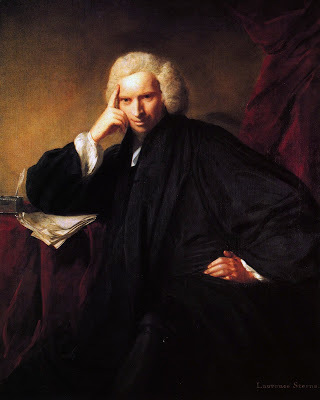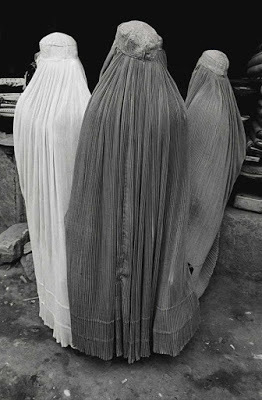Emily Cullen's Blog, page 7
October 26, 2015
Anatomy of a Genius - some gothic flash fiction to get you into Halloween mood
I’ve been tuning up my gothic sensibility as Halloween rapidly approaches, and to help get into the mood, I’ve written a short piece of flash fiction which has just been published by The Galway Review. ‘Anatomy of a Genius’ is inspired by real events that took place in 1768 after the death of author, Laurence Sterne.
 Portrait of Laurence Sterne by Sir Joshua Reynolds, 1760
Portrait of Laurence Sterne by Sir Joshua Reynolds, 1760
Body snatching by 'resurrectionists' or 'resurrection-men' was not outlawed until the Anatomy Act of 1832. 'Truth is certainly stranger than fiction' in this curious case of life imitating art. By way of a gloss, ‘Yorick’ is the name of the dead court jester whose skull is exhumed by the gravedigger in Act 5, Scene 1, of William Shakespeare’s Hamlet. The same name was used by Laurence Sterne in his novels Tristram Shandy and A Sentimental Journey as the surname of one of the characters, a parson who is a humorous portrait of the author. Indeed, Parson Yorick is supposed to be descended from Shakespeare's Yorick.
I hope you enjoy the piece which you can read here.
 Portrait of Laurence Sterne by Sir Joshua Reynolds, 1760
Portrait of Laurence Sterne by Sir Joshua Reynolds, 1760Body snatching by 'resurrectionists' or 'resurrection-men' was not outlawed until the Anatomy Act of 1832. 'Truth is certainly stranger than fiction' in this curious case of life imitating art. By way of a gloss, ‘Yorick’ is the name of the dead court jester whose skull is exhumed by the gravedigger in Act 5, Scene 1, of William Shakespeare’s Hamlet. The same name was used by Laurence Sterne in his novels Tristram Shandy and A Sentimental Journey as the surname of one of the characters, a parson who is a humorous portrait of the author. Indeed, Parson Yorick is supposed to be descended from Shakespeare's Yorick.
I hope you enjoy the piece which you can read here.
Published on October 26, 2015 08:41
August 26, 2015
The couplet as platform for resistance for Afghan women
Imagine risking severe punishment or even your life for just two lines of poetry… Now visualise doing this, not just once, but on a weekly basis. Poetry has become a powerful vehicle of expression for the silenced women of Afghanistan and I was fascinated, recently, to learn about a tight form known as the landay. I confess that the only other poetic type I knew about from Central Asia was the ghazal (a relatively short form of no more than a dozen couplets, which originated in 10th century Iran and often addresses themes of love) so I was intrigued to learn that the landay is a brief two-line poem, traditionally only performed orally. Each poem has twenty-two syllables: nine in the first line, thirteen in the second and it ends with the sound “ma” or “na.” Sometimes landays rhyme, but more often not. Quite different to the equally compact but even tighter haiku form (which originated in Japan, is typically made up of three lines of 5/7/5 syllables and often draws its power from contrasting the micro and macro on the theme of nature), the landay is driven by vital emotions of anger, heartache or love. Though this couplet dates back thousands of years, it has become a particularly potent lifeline and secretive form of rebellion for Afghan women within the climate of fundamentalist conservatism fostered by the Taliban. Female poetic self-expression, within this culture, implies dishonour and free will.
A Kabul-based female writers group, known as the Mirman Baheer literary society, is empowering women to share these couplets with each other and to resist the culture of muteness imposed by their male-dominated society. The pioneering Mirman Baheer group was founded by MP, Sahira Sharif, to enable Afghan women to communicate with each other and to express their deepest thoughts about their every day realities such as war, the Taliban, American soldiers, sexual oppression, drone strikes and military weapons, social media, love and sex. The groups members range from professional urban women to young girls in remote rural villages, many of whom are forced to participate in secret by phoning into group meetings. Speaking last month at London’s Southbank Poetry International weekend Sharif stated: “If women are writing poetry, it means they are risking their lives. In our community, if a woman writes some words, it is seen as stigmatising family honour. And that’s why she always tries to hide her name and her identity when writing poetry. But this poetry is much more powerful than the sword. It could be our best medium to fight what is going on.”
I was particularly struck by the poignant concision of the following poem:
When sisters sit together, they always praise their brothers. When brothers sit together, they sell their sisters to others.
Other examples included below were published in an article by Hannah Ellis-Petersen which appeared in The Guardian on 6 June 2015 and also in a feature by Lyse Doucet on the BBC news website, dated 21 October 2013.
 Some Contemporary Womens’ Landays:
Some Contemporary Womens’ Landays:
You won’t let me go to school. I won’t become a doctor. Remember this. One day, you will be sick.
May God destroy the Taliban and end their wars. They’ve made Afghan women into widows and whores.
Oh my God, all the warlords testing their weapons again
And earning a lot of money out of war - Dr. Masouda
Making love to an old man Is like fucking a shrivelled cornstalk black with mould
My love gave his life for our homeland.
I'll sew his shroud with one strand of my hair.
You sold me to an old man, father
May god destroy your home; I was your daughter
When we read these landays we can appreciate that they are so much more than just two lines of text - they constitute crucial lifelines, acts of resistance, tools of coping, learning and surviving within a war-torn society. These micro-poems allow us to unpack so much about the every day lives of women in Afghanistan. They remind us, not only of all we take for granted, in our industrialised West, in relation to education, freedom of speech and poetry itself, but also of the unbroken, transformative power of this medium to condense and transmit vital truths that need to be articulated.
You can read further about the history of the landay and many more fine examples of this art form in I Am the Beggar of the World: Landays from Contemporary Afghanistan, a collection translated into English by Eliza Griswold (who has helped to bring global attention to this poetry) and with photography by Seamus Murphy.
A Kabul-based female writers group, known as the Mirman Baheer literary society, is empowering women to share these couplets with each other and to resist the culture of muteness imposed by their male-dominated society. The pioneering Mirman Baheer group was founded by MP, Sahira Sharif, to enable Afghan women to communicate with each other and to express their deepest thoughts about their every day realities such as war, the Taliban, American soldiers, sexual oppression, drone strikes and military weapons, social media, love and sex. The groups members range from professional urban women to young girls in remote rural villages, many of whom are forced to participate in secret by phoning into group meetings. Speaking last month at London’s Southbank Poetry International weekend Sharif stated: “If women are writing poetry, it means they are risking their lives. In our community, if a woman writes some words, it is seen as stigmatising family honour. And that’s why she always tries to hide her name and her identity when writing poetry. But this poetry is much more powerful than the sword. It could be our best medium to fight what is going on.”
I was particularly struck by the poignant concision of the following poem:
When sisters sit together, they always praise their brothers. When brothers sit together, they sell their sisters to others.
Other examples included below were published in an article by Hannah Ellis-Petersen which appeared in The Guardian on 6 June 2015 and also in a feature by Lyse Doucet on the BBC news website, dated 21 October 2013.
 Some Contemporary Womens’ Landays:
Some Contemporary Womens’ Landays:You won’t let me go to school. I won’t become a doctor. Remember this. One day, you will be sick.
May God destroy the Taliban and end their wars. They’ve made Afghan women into widows and whores.
Oh my God, all the warlords testing their weapons again
And earning a lot of money out of war - Dr. Masouda
Making love to an old man Is like fucking a shrivelled cornstalk black with mould
My love gave his life for our homeland.
I'll sew his shroud with one strand of my hair.
You sold me to an old man, father
May god destroy your home; I was your daughter
When we read these landays we can appreciate that they are so much more than just two lines of text - they constitute crucial lifelines, acts of resistance, tools of coping, learning and surviving within a war-torn society. These micro-poems allow us to unpack so much about the every day lives of women in Afghanistan. They remind us, not only of all we take for granted, in our industrialised West, in relation to education, freedom of speech and poetry itself, but also of the unbroken, transformative power of this medium to condense and transmit vital truths that need to be articulated.
You can read further about the history of the landay and many more fine examples of this art form in I Am the Beggar of the World: Landays from Contemporary Afghanistan, a collection translated into English by Eliza Griswold (who has helped to bring global attention to this poetry) and with photography by Seamus Murphy.
Published on August 26, 2015 18:29
May 16, 2015
32 Statements About Poetry by Marvin Bell
1. Every poet is an experimentalist.
2. Learning to write is a simple process: read something, then write something; read something else, then write something else. And show in your writing what you have read.
3. There is no one way to write and no right way to write.
4. The good stuff and the bad stuff are all part of the stuff. No good stuff without bad stuff.
5. Learn the rules, break the rules, make up new rules, break the new rules.
6. You do not learn from work like yours as much as you learn from work unlike yours.
7. Originality is a new amalgam of influences.
8. Try to write poems at least one person in the room will hate.
9. The I in the poem is not you but someone who knows a lot about you.
10. Autobiography rots.
11. A poem listens to itself as it goes.
12. It’s not what one begins with that matters; it’s the quality of attention paid to it thereafter.
13. Language is subjective and relative, but it also overlaps; get on with it.
14. Every free verse writer must reinvent free verse.
15. Prose is prose because of what it includes; poetry is poetry because of what it leaves out.
16. A short poem need not be small.
17. Rhyme and meter, too, can be experimental.
18. Poetry has content but is not strictly about its contents. A poem containing a tree may not be about a tree.
19. You need nothing more to write poems than bits of string and thread and some dust from under the bed.
20. At heart, poetic beauty is tautological: it defines its terms and exhausts them.
21. The penalty for education is self-consciousness. But it is too late for ignorance.
22. What they say “there are no words for”–that’s what poetry is for. Poetry uses words to go beyond words.
23. One does not learn by having a teacher do the work.
24. The dictionary is beautiful; for some poets, it’s enough.
25. Writing poetry is its own reward and needs no certification. Poetry, like water, seeks its own level.
26. A finished poem is also the draft of a later poem.
27. A poet sees the differences between his or her poems but a reader sees the similarities.
28. Poetry is a manifestation of more important things. On the one hand, it’s poetry! On the other, it’s just poetry.
29. Viewed in perspective, Parnassus is a very short mountain.
30. A good workshop continually signals that we are all in this together, teacher too.
31. This Depression Era jingle could be about writing poetry: Use it up / wear it out / make it do / or do without.
32. Art is a way of life, not a career.
2. Learning to write is a simple process: read something, then write something; read something else, then write something else. And show in your writing what you have read.
3. There is no one way to write and no right way to write.
4. The good stuff and the bad stuff are all part of the stuff. No good stuff without bad stuff.
5. Learn the rules, break the rules, make up new rules, break the new rules.
6. You do not learn from work like yours as much as you learn from work unlike yours.
7. Originality is a new amalgam of influences.
8. Try to write poems at least one person in the room will hate.
9. The I in the poem is not you but someone who knows a lot about you.
10. Autobiography rots.
11. A poem listens to itself as it goes.
12. It’s not what one begins with that matters; it’s the quality of attention paid to it thereafter.
13. Language is subjective and relative, but it also overlaps; get on with it.
14. Every free verse writer must reinvent free verse.
15. Prose is prose because of what it includes; poetry is poetry because of what it leaves out.
16. A short poem need not be small.
17. Rhyme and meter, too, can be experimental.
18. Poetry has content but is not strictly about its contents. A poem containing a tree may not be about a tree.
19. You need nothing more to write poems than bits of string and thread and some dust from under the bed.
20. At heart, poetic beauty is tautological: it defines its terms and exhausts them.
21. The penalty for education is self-consciousness. But it is too late for ignorance.
22. What they say “there are no words for”–that’s what poetry is for. Poetry uses words to go beyond words.
23. One does not learn by having a teacher do the work.
24. The dictionary is beautiful; for some poets, it’s enough.
25. Writing poetry is its own reward and needs no certification. Poetry, like water, seeks its own level.
26. A finished poem is also the draft of a later poem.
27. A poet sees the differences between his or her poems but a reader sees the similarities.
28. Poetry is a manifestation of more important things. On the one hand, it’s poetry! On the other, it’s just poetry.
29. Viewed in perspective, Parnassus is a very short mountain.
30. A good workshop continually signals that we are all in this together, teacher too.
31. This Depression Era jingle could be about writing poetry: Use it up / wear it out / make it do / or do without.
32. Art is a way of life, not a career.
Published on May 16, 2015 17:19



